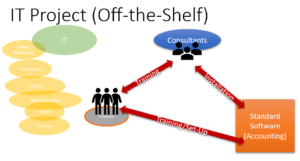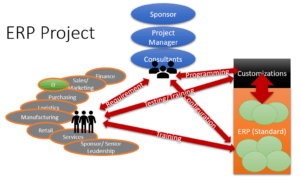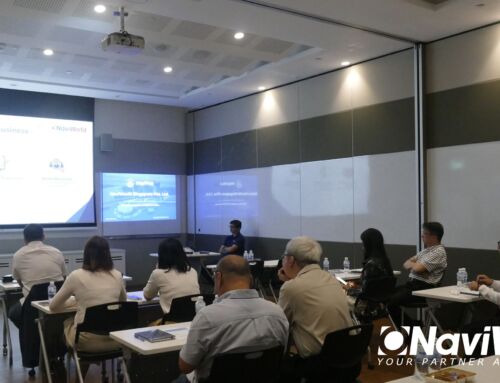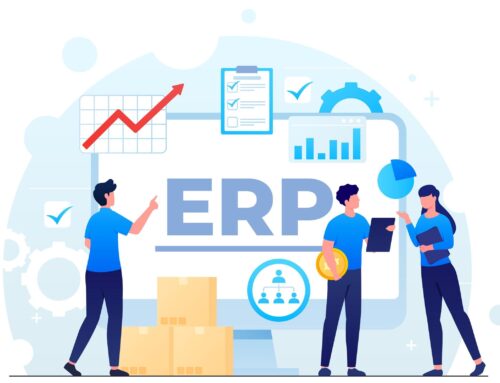
Seven Myths About ERP
(Part 1 of 2)
Introduction
Evaluating and understanding of ERP is not an easy task. Some experienced IT professionals I spoke to have little knowledge of ERP (Enterprise Resource Planning).
There are at least seven myths about ERP that created many misconceptions about ERP. These misconceptions influence the decision on the selection of ERP and ERP implementation partners. Quite often, it resulted in some tragic outcomes. I will illustrate this with two of the failed ERP projects that I encountered over the last few years.
Case of a Recycling Company
A recycling company selected its ERP solution and implementation partner three years before they contacted us. Upon visiting them, we found the following:
- The project was halted after two years of implementation.
- Many customizations were done in the project.
- The inventory cost was wrong.
- We discovered that nearly all the customizations were not needed and can be done through workaround or standard ERP functionalities.
Their reasons for selecting the previous implementation partner: The former partner was a Gold Certified Partner and Partner of the Year.
Case of a Trading Company
A trading company selected its ERP and partner two years earlier before they contacted us. So, what were the issues?
- The project could not go live after 1.5 years.
- Keep doing customizations.
Their reasons for selecting their previous partner: Partner of the Year, Gold Partner, and 15 years of history with many customer references.
We eventually took over and got their project live within three months in 2014 with nearly zero customization.
I will go through some of the seven myths about ERP that I observed over my years of working in the ERP industry.
The Seven Myths about ERP
There are at least the following seven myths about ERP that I often encountered.
- ERP Project is an IT Project
- Project Management is Not Important
- ERP can Solve the Human Problem
- We Can Customize to What you Want
- Good ERP Vendors have Awards
- There is the Best ERP for me
- Bigger Support Team is Better
I will go through the first three myths and cover the remaining myths in my next article.
ERP Project is IT Project
The Myth about ERP
ERP projects are commonly regarded as IT projects. However, this is very far from the truth in practice.
Let me share a case study of a previous ERP project to illustrate this.
We had an international customer who engaged us to implement their ERP project for their Singapore office. This project involved full implementation. With our recommendation, they appointed their Finance and Customer Services Managers to lead this project.
The project for the Singapore office was completed within four months in 2014. It was on-time and within budget.
Later, the company planned to roll out the same ERP design to its China office. The China Project was a more straightforward roll-out project as compared to the Singapore project. The plan was to have the China office follow the Singapore process. Only minor adjustments were needed to meet the China local regulatory requirement.
As the Singapore project was very smooth and appeared to be easy, their IT executive volunteered to take on the project manager’s role. That project struggled to complete in 9 months. More than double the time took for the Singapore project.
The Truth
There are three common types of software implementation project in companies that involve business processes:
- Customized Software
- Off-the-shelf Software
- ERP Project
The following diagrams illustrate the differences in the complexity of the various software projects.
Customized Software
Main persons involved: IT and the Stakeholder Department
Interactions: Simpler
Off-the-shelf Software
Main persons involved: Stakeholder Department.
Interactions: Simplest
ERP Project
Main persons involved: Multiple Departments
Interactions: Complex
So, why ERP projects should not be managed like common IT Projects?
- It takes more time to learn business processes than the features and functions in ERP Software. An average IT person will find it challenging to understand ERP without some accounting knowledge.
- It is challenging to manage the diverse interests of the many stakeholders involved in the project.
- ERP consultants need to understand the Standard Functionalities well when doing additional customizations.
In short, ERP projects are complex Business Process projects that require intensive people interactions.
Project Management is Not Important
The Myth about ERP
This myth is related to the first ERP myth.
When people treat ERP as a straightforward software project, they will believe that Project management is not essential.
Even some ERP vendors believe so. These vendors will assign the implementation consultant to double up as the project manager to save costs.
The Truth
The truth is: Project Management is VERY Important.
From the failed projects that I encountered over the years, I observed that the lack of good project management was one of the key factors contributing to the failure.
Project management is essential for ERP projects due to its complexity and multiple stakeholders. Very often, it is the key to achieving On-Time and On-Budget outcome.
Project management is not project coordination, as most people commonly understand it.
A good project manager is a trained professional. They manage the following 5 phases of the project.
- Initiating
- Planning
- Executing
- Monitoring and Controlling
- Closing
A good project manager needs skill in ten areas, as mentioned in the Project Management Institute:
- Integration
- Scope
- Time
- Cost
- Quality
- Procurement
- Human resources
- Communications
- Risk management
- Stakeholder management
You may also read my previous article on “10 Keys to Successful ERP Implementation“. The article explains the 10 critical factors for successful ERP implementation.
ERP can Solve the Human Problem
The Myth about ERP
I met some senior management who wanted to use ERP to control their employee. They believe that suitable technologies will help them to manage their employee better.
The Truth
What is Management
So, what is management?
Management involves:
- Identifying the mission, objective, procedures, rules
- Manipulation of the human capital of an enterprise to contribute to the success of the enterprise.
ERP probably can help in executing procedures and some operations rules. But managers have to carry out the other functions. In other words, no technology can replace a good manager. Even the procedures and rules have to be defined by the management for the ERP to execute.
Benefits of ERP
However, there is one significant benefit of ERP that affect employee behavior. ERP improves the transparency of information throughout the organization.
In organizations where information is not easily accessible, people will become defensive. It will be difficult to create trust among the different departments.
We implemented an ERP project for a retail and distribution company a few years ago. Their previous system did not integrate directly into their warehouse operations. As such, their salespersons did not have on-time inventory information. To meet their sales target and reduce stockout risk when they receive orders, the salespersons will reserve stock before the order is confirmed.
So, what were the consequences?
- The company had a high inventory level.
- When the reserved stock was not sold on time, they had to incur substantial discounts to clear stocks expiring soon.
I met a business partner two years after we implemented the project. And we realized that we both serve the same customer. I discussed the ERP project that we implemented for this customer. It was to my surprise that he noticed changes to their employee behavior over the last two years. He observed that the employees were more pleasant to deal with now. They also appeared to be less stressed up as compared to a few years ago.
So, in this aspect, a well-implemented ERP project does create positive behavior and make the job for manager easier. But, it cannot replace good management.
Conclusion of Part 1 of Seven Myths about ERP
In this article, I covered two cases of project failure. I illustrated the first three myths about ERP.
In my next article, I will cover the remaining myths about ERP and end with my recommendations to achieve the most benefits from your ERP projects.






